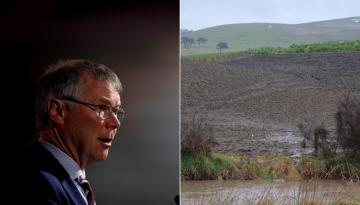
Controversial rules around winter grazing have been delayed until next year after farmers complained they were impractical and unworkable.
The rules - part of freshwater regulations introduced last year - were supposed to come into effect in May, but that deadline has now been pushed back a year.
Winter grazing - a practice where stock are strip-fed a crop, often in extremely muddy conditions - has come under increased scrutiny in recent years, with critics saying it is an environmental and animal welfare issue.
In announcing the deferment, Environment Minister David Parker said the farming sector had agreed to make immediate improvements to intensive winter grazing (IWG) methods for the coming season.
"If done poorly, IWG has serious negative effects on animal welfare and the environment, particularly freshwater health and estuaries," Parker said.
"Farming leaders accept that these practices need to improve and they want to be part of the solution."
He said the one-year deferment will enable a "IWG farm plan module to be rapidly developed, tested and deployed ready for formal incorporation into wider certified freshwater farm plans in 2022".
Parker said he still expects immediate improvements to be made around winter grazing practices and the rules preventing the expansion of IWG will still apply.
"Increased monitoring and reporting by councils will also ensure measurable improvements in IWG by May 2022. This will include quarterly reports to me."
Agriculture Minister Damien O'Connor said the decision provided certainty of direction and timeframe for farmers.
A draft IWG farm module has been developed by the Southland Advisory Group, which included Environment Southland, DairyNZ, Beef + Lamb, Fish and Game and Federated Farmers, with input from iwi and Local Government NZ.
Greenpeace says decision shows Government 'owned by big dairy'
The decision was well-received by industry, but Greenpeace said it showed the Government was "owned by big dairy".
Jim van der Poel, chair of DairyNZ said the decision to deliver change via a module as part of certified farm plans, rather than rules, was "good news for farmers".
"This gives farmers reassurance they can prepare for winter," he said.
His view was echoed by Federated Farmers water spokesperson Chris Allen, who said he was pleased the Government had taken the time to listen to the sector.
Allen said there was "universal recognition" that the rules passed in August last year "have a number of unworkable parts".
"The parts that relate to the regulation of intensive winter grazing were one of the first ones to take effect and therefore needed urgent attention."
But Greenpeace accused the Government of "buckling to New Zealand's dirtiest industry" and called the decision "pathetic".
"Leaving a bad practice unregulated and thanking industry for their promises to make it slightly better is no substitute for getting rid of it, as the Government should be doing with intensive winter grazing," said Greenpeace senior campaigner Steve Abel.
"In the middle of a climate and freshwater emergency, it's pathetic and depressing to see our Government so captured by industry instead of doing the right thing."
The Green Party also accused the Government of "caving into agribusiness"
"The Government's reliance on a voluntary approach by farmers, rather than enforcing rules to control harmful intensive winter grazing, is a 'hope and pray' approach to healthy rivers," the party's environmental spokesperson Eugenie Sage said.
She said the country needed to move to more sustainable farming practices.
"There are many farmers who are at the forefront of improving farm practice and who recognise the realities of a changing climate and polluted rivers. They recognise that such intensive stocking and grazing has to end.
"We should bolster those farmers who want to reduce pollution and keep animals healthy, rather than allowing this practice to continue."




